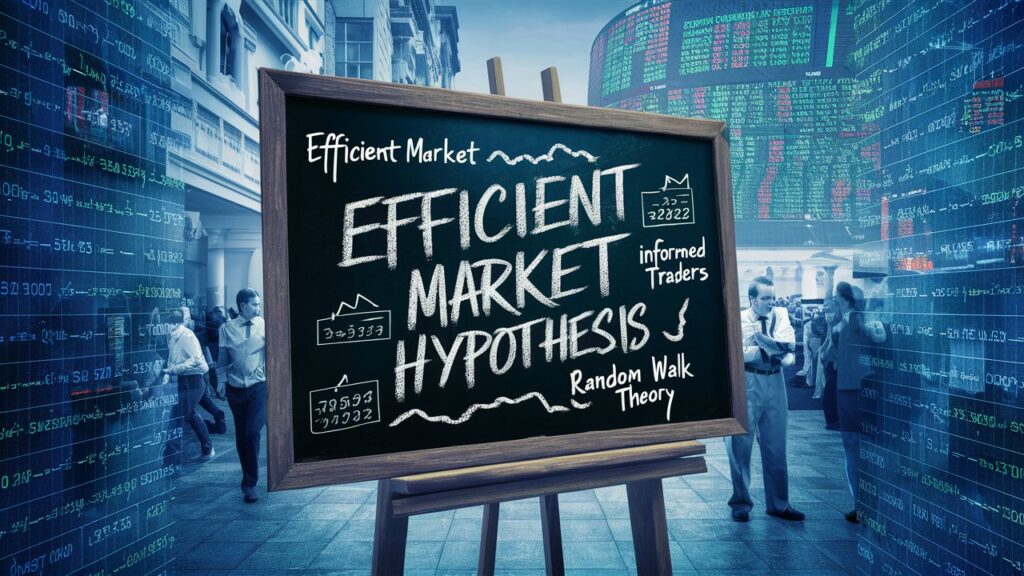What is Efficient Markets Hypothesis?
In an efficient markets, securities prices already reflect all relevant information, making it impossible to beat the market.

A Short Example
A counter-example: “I’d be a bum in the street with a tin cup if the markets were efficient.” Warren Buffett.
A Deep Dive into Efficient Markets Hypothesis
Eugene Fama proposed the concept of market efficiency in the 1960s. Previously, it was believed that selecting the right investments may result in higher returns. The term ‘excess returns’ refers to profits that exceed the risk-free rate and are not explained by a risk premium, which is the incentive for taking risk. According to Fama, securities will be valued based on all available information due to the large number of active and knowledgeable market participants. This led to the concept of efficient markets, where beating the market is impossible.
The Efficient Markets Hypothesis (EMH) exists in three traditional variants. These are: weak, semi-strong, and strong.
Weak From Efficiency
Using investment strategies based on historical pricing or financial data does not result in extra returns under weak-form efficiency. If this efficiency is accurate, technical analysis cannot generate excess returns. Using historical data, such as price and volume, does not guarantee better performance than a buy-and-hold approach. Current prices are frequently considered the most accurate assessment of an investment’s value, taking into account all past data. Random news can lead to random price movements. Technical analysis is not viable.
Semi Strong Form Efficiency
In the semi-strong form of the EMH, a trading strategy based on publicly available fundamental information (e.g. financial statements) and historical price data does not outperform a buy-and-hold strategy. Share prices respond instantly to publicly available information, and no further returns may be obtained from exploiting it. Fundamental analysis is not viable.
Strong Form Efficiency
In strong-form efficiency, share prices reflect all knowledge, both public and private, fundamental and historical, and no one can earn higher returns.
It is not feasible to provide inside information.
EMH tests should consider trading costs and execution efficiency.
Andrew Lo’s Adaptive Market Hypothesis is a less robust version of EMH. This notion is connected to behavioural finance and posits that market participants adjust to changing markets, information, and models to achieve market efficiency. However, there may be possibilities for excess profits in the meanwhile.
Profit, Efficiency, and Luck: Exploring the Limits of the Efficient Markets Hypothesis
New contracts and exotic derivatives often result in a brief time of excess profit before knowledge spreads and profit margins decrease. The same applies to previously overlooked sources of convexity and value. A profitable method can last for a while, but it may be discovered or exploited, resulting in the loss of efficiency.
According to the Grossman-Stiglitz dilemma, if a market accurately reflects all available knowledge, there would be no incentive to obtain the information used to determine prices. The job has been completed for everyone. This occurs when a model is calibrated based on derivative market prices without considering the underlying process data.
The validity of the EMH, whatever of its form, is crucial in determining whether investors can outperform the market or rely solely on luck for success. EMH assumes that investors would react randomly to news or data, preventing them from making an excessive profit. Market bubbles do not invalidate EMH if they cannot be exploited.
Numerous research have explored the validity of the EMH in various forms. Several early studies supported the weak form. Bond markets and large-capitalization equities are considered more efficient than smaller stocks. Real estate is often perceived as inefficient due to differences in information quality and emotional factors among investors.
Related Readings
- Put-Call Parity: All You Need To Know
- Modelling Approaches in Quantitative Finance: All You Need To Know
- Central Limit Theorem In Finance: Power Your Portfolio Now